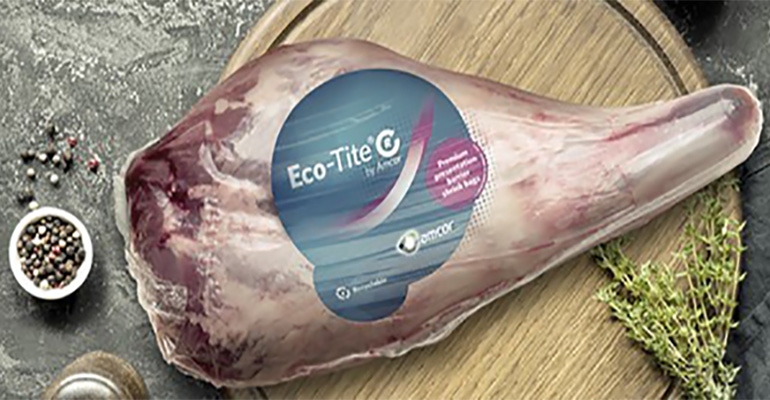Amcor Launches First Recyclable Shrink Bag for Food Packaging
Eco-Tite R meets polyethylene stream requirements and is engineered to maximize shelf life, maintain food safety, and reduce food waste for meat, poultry, and cheese.
December 7, 2020

Global packaging supplier Amcor announced December 7 the launch of Eco-Tite R in Europe, the first polyvinylidene chloride (PVDC)-free shrink bag for fresh and processed meat, poultry and some cheeses designed to be recycled. The material is to maximize shelf-life, maintain food safety, reduce food waste and can be recycled in existing polyethylene (PE) plastic recycling streams.
"Through our packaging expertise and commitment to sustainability, the team has overcome a challenge for the industry; developing a high performance shrink bag that's PVDC-free and recyclable, while maintaining food safety,” said Rosalia Rosalinova, marketing manager for meat and fresh produce at Amcor. “This is a great step-forward for consumers and an example of how the removal of problematic materials from packaging — something the industry is increasingly focused on delivering — can provide us with safe, secure and recyclable packaging."
Amcor Eco-Tite R is a multilayer, mono-PE packaging that maintains a high barrier to oxygen and water vapor even when exposed to high-moisture environments, such as cooler cases and refrigerators. This solution provides European meat and cheese producers an alternative to PVDC packaging, which is not recyclable in mechanical or chemical recycling systems.
To validate recyclability in real-world conditions, Amcor Eco-Tite R has been certified by the cyclos-HTP institute, an independent testing lab.
Consumers can begin recycling Eco-Tite R bags where suitable infrastructure is in place, including Germany, France and Italy, The Netherlands, Norway, Austria, and Spain. Recyclability of the new shrink bag will grow as infrastructure develops in additional countries.
This innovation also supports Amcor's broader commitment to develop all its packaging to be recyclable or reusable by 2025, which it committed to in 2018 as part of its pledge.
About the Author(s)
You May Also Like


